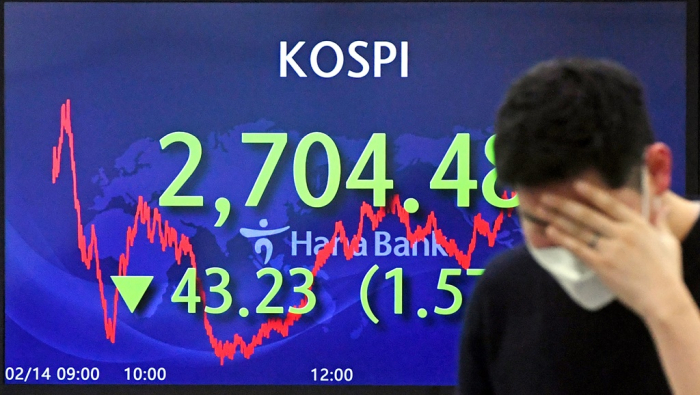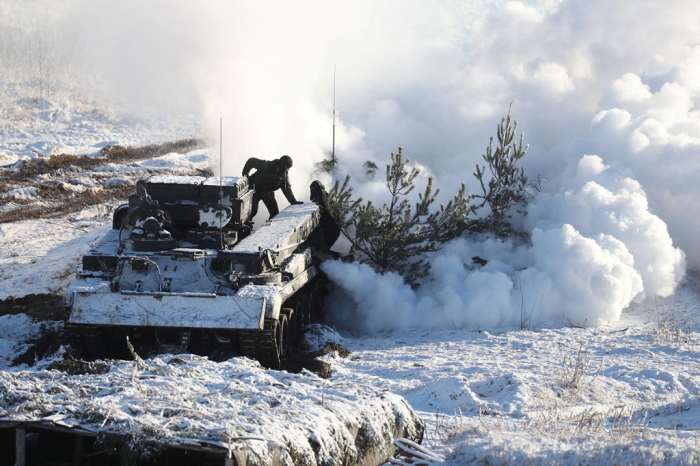Stocks
Ukraine woes, global tightening knock down Asian stocks
Kospi hits the lowest point in more than two weeks with large caps down; some recommend buying stock on dips
By Feb 14, 2022 (Gmt+09:00)
3
Min read
Most Read
LG Chem to sell water filter business to Glenwood PE for $692 million


Kyobo Life poised to buy Japan’s SBI Group-owned savings bank


KT&G eyes overseas M&A after rejecting activist fund's offer


StockX in merger talks with Naver’s online reseller Kream


Mirae Asset to be named Korea Post’s core real estate fund operator



Asian stock markets lost ground on Monday with South Korea’s main shares down to their lowest level in more than two weeks as rising tensions over Ukraine boosted expectations of inflation that could speed up rate hikes by central banks, especially the US Federal Reserve.
Investor sentiment soured further on disappointing corporate earnings and increased short selling.
South Korea’s Kospi ended down 1.57% to 2,704.48 after falling to as low as 2,688.24 on Monday, the lowest point since Jan. 28, amid a slide in most large caps such as Samsung Electronics Co. and LG Energy Solution Ltd. NCSoft Corp., Samsung SDI Co. and Hyundai Motor Co. fell to 52-week lows.
The junior Kosdaq lost 2.81% as 114 names including HLB Co., KMW Inc., hit all-time troughs. Mirae Asset Global Investments Co.’s TIGER KEDI Innovator ESG30 exchange-traded fund (ETF), tracking The Korea Economic Daily’s in-house index, skidded 1.7%.
Stocks in other Asian countries saw similar declines. Japan’s Nikkei index fell 2.23% and China’s benchmark Shanghai Composite Index declined 1.09%. Taiwan and Hong Kong shares slid 1.71% and 1.39%, respectively.
TIGHTENING AMID WAR RISK?
Investors have shunned risky assets on growing concerns over a potential full-scale invasion by Russia into Ukraine that could further accelerate inflation. Russia produces 16% of the world's natural gas and 12% of crude oil.
US President Joe Biden told Russia’s Vladimir Putin that the West would respond decisively to any invasion of Ukraine, but the warning failed to ease tensions.

Russia may suspend supply of the energy resources, significantly increasing inflationary pressure, if the US and its allies impose economic sanctions to avoid military conflicts, analysts said. The Fed is expected to raise interest rates sooner than earlier forecast, they added.
“Stock markets are haunted by worries that the Fed’s aggressive tightening could hurt an economic recovery,” said SK Securities’ research center head Choi Seok-won.
Disappointing South Korean corporate earnings further weighed on investor sentiment with 70% of firms logging results for the fourth quarter below forecast, according to financial information provider FnGuide Inc. That was worse than 63% last year and 62.8% in 2019.
Some analysts advised raising cash holdings to deal with further losses.
“It is better to maximize cash holdings and focus on defensive stocks such as financial and telecom names,” Lee Kyung-min, an analyst at Daishin Securities Co. said.
BUY ON DIPS
Some experts, however, said the recent declines in stock markets provided are a chance to buy stocks at a bargain for long-term investment.
Stocks of companies with healthy earnings are expected to rebound once the geopolitical tensions are resolved and inflation slows, they added.
“It takes about a week for markets to rebound even in a war,” said Growth Hill Asset Management CEO Kim Tae-hong. “Around the 2,700 level, which is about 20% down from the (Kospi’s) peak, it is better to buy stocks backed by strong earnings on dips.”
Meritz Securities analyst Hwang Soo-wook said the impact on financial markets of any military conflict between Russia and Ukraine may not be so severe.
“In the past, when an expected war broke out, stock markets rose,” Hwang said. “Since stock prices have been reflecting the war risk, they are likely to rebound once it happens.”
Write to Sung-Mi Shim and Hyeong-Gyo Seo at smshim@hankyung.com
Jongwoo Cheon edited this article.
More to Read
-
 Shipping & ShipbuildingHanwha Ocean shares sink after KDB's sale of 4.2% stake
Shipping & ShipbuildingHanwha Ocean shares sink after KDB's sale of 4.2% stakeApr 29, 2025 (Gmt+09:00)
-
 EnergySouth Korea nears Czech nuclear deal; Doosan, related stocks fly high
EnergySouth Korea nears Czech nuclear deal; Doosan, related stocks fly highApr 25, 2025 (Gmt+09:00)
-

-
 Business & PoliticsSeoul, Washington agree on July tariff deal framework in '2+2' trade talks
Business & PoliticsSeoul, Washington agree on July tariff deal framework in '2+2' trade talksApr 25, 2025 (Gmt+09:00)
-

Comment 0
LOG IN


